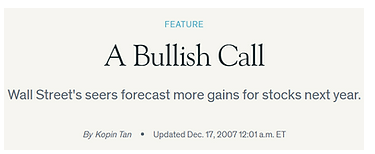“Getting rich is one thing. Staying rich is quite another.” – Morgan Housel, The Collaborative Fund
We are often asked a variation of “what are savvy investors doing right now?” It’s a difficult, if not impossible, question to answer as each investor has their own unique set of circumstances. We believe a more insightful question is, “what are savvy investors not doing right now?”
We have railed against mutual funds, alternative investments, financial salespeople, etc. Furthermore, most readers know they shouldn’t time the market, chase speculative performance, or live beyond their means. We thought it might be helpful to take it to the next level by outlining mistakes that might not be obvious, but can lead to negative unintended consequences.
Working with a Non-Fiduciary Broker in the Information Age
In 2018, if you’re working with a salesperson that openly puts their interest ahead of your own, you’re asking for trouble. Brokers have made a living convincing the investing public they are trusted advisors (and the lines aren’t always clear). The best way to find out if your advisor is a fiduciary is to ask them directly… and get it in writing. Google their respective firm to see if they are a fiduciary. Check FINRA for marks against their record.
Wells Fargo’s blatant lack of regard for its customers has us questioning our personal and business relationships. Wouldn’t you want to know if the company you’re working with is actively fleecing the American public? We like to use Violation Tracker to see if corporate actions align with our values.
Action item: Work with an advisor that puts your interests first.
Get it in Writing
There is an old broker saying, “The biggest liar gets the business.” Since most financial advisors are compensated to sell or bring in assets, they will say anything to win the business. Better yet, during a sales pitch, very little is put in writing and most of the communication is verbal. The advisor controls the information flow in which you’re basing the hiring decision on.
Taking people at their word without questioning motivations, incentives, or how their compensation works can lead to trouble. Get anything you deem important in writing. You can’t fudge or take back the written word.
Action item: Fees, adhering to a fiduciary standard, conflicts of interest, etc. Get it in writing.
Seeking Risk For a Reward that Won’t Change Your Life
We recently read the sad story of an elderly couple with $16,000,000 invested in technology stocks at the behest of an advisor. After the dot-com bubble burst, the couple was left with $3,000,000 and a ton of regret. In the aftermath, another advisor asked if growing their investable assets from $16,000,000 to $25,000,000 would have changed their life. The couple said no. However, allocating to frothy technology stocks with their entire portfolio unnecessarily increased their risk of ruin. The large bet essentially had limited upside (wouldn’t change their life if they were right), but could endanger their retirement dreams.
Action item: Ask yourself if the best possible outcome would change your life. If the answer is no, doing nothing is fine.
Forgetting Negative Outcomes are Part of Investing
To maintain perspective during good market environments, we often read market forecasts from 2007.
Here’s a headline from Barron’s in December 2007:

Source: Barron’s
The risk we take allows us to enjoy positive market returns such as those of the past nine years. It also means we will likely have negative return years, which are not a bug in the system or outlier events, but rather a normal part of investing.
Action item: Negative market returns do not mean your approach is broken, or you need to “do something.” Make sure your investment portfolio mirrors how you feel about risk.
Your Information Filters are Non-Existent
It’s a blessing and curse to have a world of information at our fingertips. How are you filtering information between meaningful and worthless? As investment professionals, we consume a high volume of commentary, research, and opinions. We would argue that developing a sound filter for information is a big part of making rational decisions and shaping our view of the world. If you consume financial media that elicits an emotional response or the need to alter your long-term investment plan, using appropriate filters could save you from making poor decisions.
From our Twitter friend Josh Brown, CEO of Ritholtz Wealth Management:
“Make sure your media diet matches up with the type of information that is both interesting and helpful to you. Make sure it’s being written by professional journalists or industry practitioners who actually know what they’re talking about.”
Action item: The best approach is to turn off the financial news. If you must, we find unfiltered blogs (like this one), offer the best source of clean information.
What other less obvious mistakes have you seen?
